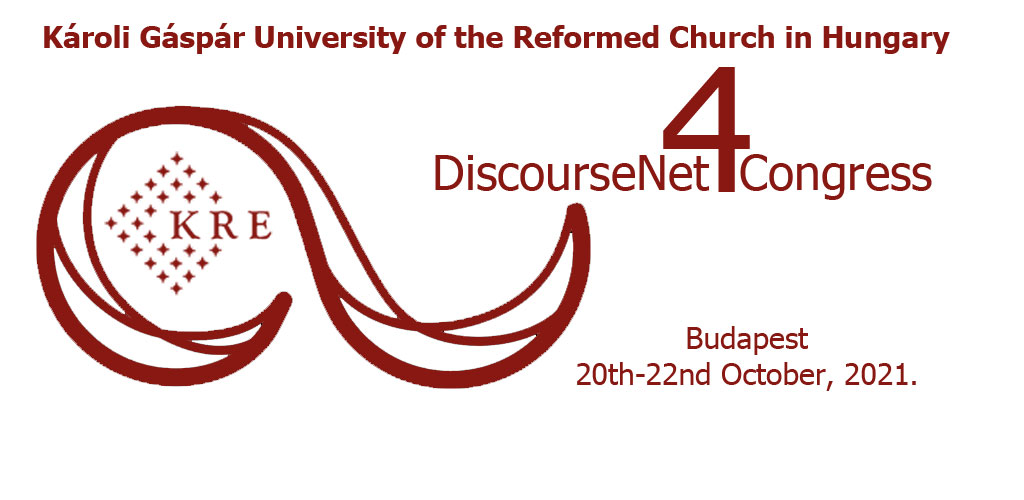Budapest
Ungarn

Theme | Programme | Registration | Conference format
Call for Papers, DiscourseNet Congress 4 in Budapest, Hungary, October 20-22, 2021
conference theme: The Impact of Discourse Studies on the Contemporary World - Making a Difference Inside and Outside the Academia
main organizer: Péter Furkó, Károli Gáspár University of the Reformed Church in Hungary
co-organizers: Jan Krasni (Tyumen, Russia), Benno Herzog (Valencia, Spain), Jens Maesse (Giessen, Germany), Johannes Angermuller (Open University, UK)
local organizers: Dóra Tóth (primary contact, toth.dora@kre.hu), Csilla Dér (KGU), Ágnes Abuczki (KGU), Nóra Csontos (KGU), Judit Nagy (KGU), Ildikó Vaskó (ELTE)
**************
Due to the continued uncertainties, the DiscourseNet board decided to go online with the academic parts of the DNC4 Congress, with the possibility of face-to-face social events, circumstances permitting.
All presenters, including the keynotes will be asked to send us a pre-recorded video of their lectures a few weeks before the event, which will be uploaded to the conference website. We are also planning to add virtual chat-rooms (written) to each lecture.
****************
The primary aim of the congress is to explore ways in which the theory and practice of Discourse Studies can bring about social change. We invite participants to share ideas about how to help individuals and communities who are marginalized, discriminated against or disenfranchised (in the broader sense). We will also aim at co-creating opportunities with a variety of non-academic groups, including political decision makers, political activists, journalists, publishers, social and technological influencers, etc. A secondary aim and proposed practical outcome of the congress is to develop an active network (a possible sub-network / working group of DiscourseNet) comprising individual researchers, representatives of academic and other research producing organizations, publishing organisations, activists, and cultural practitioners interested in coordinating and streamlining their activity towards effecting social change for disenfranchised individuals and groups.
Possible project and paper proposals for the conference include but are not limited to the following:
- collaboration between DS scholars and non-academics (e.g. journalists, political/human rights activists, artists etc.) who share the concern for helping disenfranchised individuals and groups;
- flagging social issues and societal concerns the handling of which can particularly benefit from the methodology, theory and practice of Discourse Studies;
- exploring the social, economic, political, legal, behavioural, institutional, historical, cultural or linguistic dimensions of a given disenfranchisement / discrimination issue;
- identifying processes and actors in bringing about marginalization, isolation, discrimination or disenfranchisement;
- identifying processes and actors in bringing about social / technological / political change that would reduce / eliminate the disenfranchisement / marginalization of a particular social group;
- the immigration policy of particular political actors as a disenfranchisement / human rights concern;
- ensuring independence, impartiality, objectivity and consistency in the evaluation and / or criticism of social / technological / political processes of discrimination;
- (critical) discourse analysis of discursive strategies and social figurations associated with discrimination / disenfranchisement;
- the role of discursive strategies and value judgements in perpetuating discrimination / disenfranchisement;
- strategies of disseminating research findings on disenfranchisement to a broader, non-academic public;
- the relation between symbolic and material order of discourse;
- the impact of emancipatory and anti-discriminatory discourse;
- authoritarian discourses and discourses of neo-authoritarianism.
Other topics targeting the social utility of Discourse Studies in less politicized settings might include but are not exclusive to the contribution of Discourse Studies / discourse analysis to (the study of):
- language acquisition inside and outside institutional settings (first and second language acquisition, EFL, TESL, etc.);
- cross-cultural communication;
- institutional discourse, organizational culture, dispositif, apparatus analytics;
- business communication (as both cross-cultural communication and institutional discourse);
- interviewing techniques (e.g. with a view to providing advice for gatekeepers);
- the theory and practice of translation and interpreting;
- psychology and psychoanalysis (e.g. the contribution of narrative discourse analysis);
- literary theory and literary analysis;
- gender studies;
- discourses of technology and design.
Confirmed plenary speakers:
Elizabeth Peterson, University of Helsinki
Lauren Hall-Lew, The University of Edinburgh
REGISTRATION IS NOW CLOSED
After the conference, a book proposal for a thematic volume (or possibly two) based on selected conference papers will be submitted to Palgrave Macmillan for the “Postdisciplinary Studies in Discourse” series.